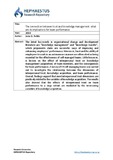| dc.contributor.author | Politis, John D. | |
| dc.date.accessioned | 2016-01-29T08:02:11Z | |
| dc.date.available | 2016-01-29T08:02:11Z | |
| dc.date.issued | 2003 | |
| dc.identifier.issn | 1367-3270 | |
| dc.identifier.uri | http://hdl.handle.net/11728/7139 | |
| dc.description.abstract | The latest buzzwords in organizational change and development literature are “knowledge management” and “knowledge transfer”, which proponents claim are successful ways of improving and enhancing employees’ performance. Moreover, trust and the ability of employees to work in an autonomous manner are often cited as being essential for the effectiveness of self‐managed teams. Little however, is known on the effect of interpersonal trust on knowledge management (acquisition) of team members, and the consequences for team performance. A survey of 49 self‐managing teams was carried out to investigate the relationship between the dimensions of interpersonal trust, knowledge acquisition, and team performance. Overall, findings support that most interpersonal trust dimensions are positively related to the variables of knowledge acquisition. The results also showed that the effects of interpersonal trust on team performance to a large extent are mediated by the intervening variables of knowledge acquisition. | en_UK |
| dc.language.iso | en | en_UK |
| dc.publisher | MCB UP Ltd | en_UK |
| dc.relation.ispartofseries | Journal of Knowledge Management; | |
| dc.relation.ispartofseries | ;Volume 7, Issue 5 | |
| dc.rights | © MCB UP Limited | en_UK |
| dc.rights.uri | http://creativecommons.org/licenses/by-nc-nd/4.0/ | en_UK |
| dc.subject | Trust | en_UK |
| dc.subject | Knowledge management | en_UK |
| dc.subject | Self managing teams | en_UK |
| dc.subject | Team performance | en_UK |
| dc.title | The connection between trust and knowledge management: what are its implications for team performance | en_UK |
| dc.type | Article | en_UK |
| dc.doi | 10.1108/13673270310505386 | en_UK |


